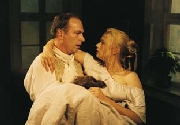Egon Günther's Die Braut (The Mask of Desire, 1999) claims to be a film about the "real" Johann Wolfgang von Goethe. Such descriptions conjure visions of a warts-and-all exposé of the beloved German poet. And indeed such a film would be possible. German biographies of Goethe rarely do anything but idolise the man, and the nastier side to his character is usually conveniently forgotten about. But Die Braut fails to paint him as the character he was, despite its publicity to the contrary.
Die Braut is actually the story of Christiane Vulpius, Goethe's partner for 28 years. The film, painting Goethe as seen through her eyes, supposedly manages to show a more relaxed and human side to the poet; a man not preoccupied with his own fame, but someone who enjoyed being about the house and around whom his servants did not feel they had to behave any differently. What to Günther may be commendable informality about the home, to others may well appear as being off-hand to his house staff.
But it is in the relationship itself that the film's view falters. Günther wants us to see how passionate Goethe was about Christiane. He says that she demonstrates her love for Goethe by not calling out to him on her deathbed and that this is her way of releasing him.
The man behind the myth
The historical facts suggest a different story: the couple lived together for eighteen years and only then married; poor Christiane bore numerous children for the famous poet, but only one child survived; and she was kept away from official events and stayed with the servants when visitors come to the house. Günther has the gall to portray all this, with Goethe swanning in and out of the house as he pleases and in and out of bed with whom he pleases. He treats Christiane more like a piece of slap and tickle than someone he really cares about and it is hard to sympathise with such a cold and distant lover.
Günther, despite his protestations to the contrary, shies away from any criticism of these actions. His plot and direction condone Goethe's misogyny by romanticising it. Christiane floats about the story like an overgrown, lust-filled Alice in Wonderland. Her character remains a complete mystery. She never really talk to her sister, or aunt or friends and there are no "girl talks" to reveal anything about her emotional state. Considering that the film is supposed to be about her, we are left feeling cheated.
This means that there is no indication of why their relationship worked and why Christiane was so tolerant of Goethe's all too human side. Günther himself has no idea why their love worked, and maintains that Christiane died of love for Goethe. The only thing that would ever have released her from her love for him was death. This is sheer supposition on Günther's part. More probably Christiane just died from extreme exhaustion after long-term exposure to such a cold, unrewarding fish of a man.
It is apparent that Günther was full of enthusiasm for this project, but was somehow not able to translate this onto the screen. The only explanation there is for this is that far more attention was paid to the period detail and to the imagery of the film than to character and plot development. In the end it is difficult to care about any of the people in Die Braut, which is a shame for a story with so much promise. The myth of Goethe the man still remains to be exploded
Elke de Wit, 1 May 2000
Anne Høegh Krohn's Fremde Freundin |
Rolf Schübel's Ein Lied von Liebe und Tod |
Pepe Danquart's Heimspiel |
Rosa von Praunheim's Der Einstein des Sex |
Andreas Kleinert's Wege in die Nacht |
Veit Helmer's Tuvalu |
Sebastian Schipper's Absolute Giganten |
Frieder Schlaich's Otomo |
Bernd Eichinger's Der Große Bagarozy |
Thorsten Schmidt's Schnee In Der Neujahrsnacht |
Doris Dörrie's Erleuchtung Garantiert |
Leander Haußmann's Sonnenallee |
Maren-Kea Freese's Zoe |
Click here for the Berlinale website |
Moving on:
- Return to the CER front page
- For more articles on Central and East European film see the Kinoeye Archive



